|
|
|
Sort Order |
|
|
|
Items / Page
|
|
|
|
|
|
|
| Srl | Item |
| 1 |
ID:
185266
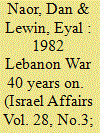

|
|
|
|
|
| Summary/Abstract |
Forty years after its occurrence, the 1982 Lebanon war remains academically understudied with the received wisdom about the conflict largely based on political and journalistic accounts. According to these accounts, the war was a political ploy by Defence Minister Ariel Sharon and Prime Minister Menachem Begin aimed at achieving far-reaching political goals rather than a defensive attempt to remove the terrorist threat to Israel’s northern areas. By placing the conflict within the context of Israeli history and the Arab-Israeli conflict, on the one hand, and the nature and characteristics of modern warfare, on the other, this article offers a more nuanced interpretation of the Lebanon War, showing that it was not fundamentally different from past military encounters.
|
|
|
|
|
|
|
|
|
|
|
|
|
|
|
|
| 2 |
ID:
185263


|
|
|
|
|
| Summary/Abstract |
This article examines the violent clashes between Hamas and Israel along the Gaza Fence (30 March 2018–27 December 2019) from a psychological operations (PSYOP) perspective. It shows how Hamas managed, through a skilful combination of mass riots, media manipulation, and quick adaptation to changing circumstances to subvert the strategic priorities of the Israel Defence Forces (IDF), wear down Israeli morale, and erode Israel’s sovereignty in its southern region – all this while deterring Israel from launching a large-scale military operation in Gaza. As such, the Gaza Fence clashes provide an example of a PSYOP-based strategy that can be applied to other border conflict zones, such as Morocco, Saudi Arabia, Mexico, and Islamist insurrections.
|
|
|
|
|
|
|
|
|
|
|
|
|
|
|
|
| 3 |
ID:
185268
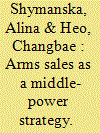

|
|
|
|
|
| Summary/Abstract |
This article examines Israel’s sales of advanced arms and technology as a middle-power foreign policy tool. By way of doing so it discusses the nature and characteristics of this policy, as well as its various components, and assesses the extent of its success in achieving its goals. It concludes that despite Washington’s occasional opposition to its arms export policies, Israel’s strategy has proved highly successful and can serve as a model for middle powers seeking to improve their status and prestige in the contemporary international system.
|
|
|
|
|
|
|
|
|
|
|
|
|
|
|
|
| 4 |
ID:
185271


|
|
|
|
|
| Summary/Abstract |
This article examined a model that focused on the association between attitudes towards food fraud (AFF) and such factors as food safety concerns, self-labelling as a victim and national culture. The online survey included 106 German and 363 Israeli respondents and questionnaires on attitudes towards food fraud, food safety concerns, self-labelling as a victim of food fraud, and sociodemographic characteristics. The results indicate that national culture and self-labelling as a victim predict food safety perception, which predicts AFF. The discussion addressed the findings in the context of collective victimisation, exposure to food fraud, and national culture.
|
|
|
|
|
|
|
|
|
|
|
|
|
|
|
|
| 5 |
ID:
185267
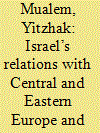

|
|
|
|
|
| Summary/Abstract |
This article examines the role of Jewish Diaspora considerations in Prime Minister Benjamin Netanyahu’s policy towards the states of Central and Eastern Europe. Israel has traditionally sought to attain both its state-centred national goals and those of the Jewish Diaspora. Under the Netanyahu governments (2009–21) a major change took place whereby the Diaspora’s existence was viewed as dependent on Israel’s continued survival and success; hence only a strong Israel can help the Diaspora. The security and wellbeing of the Jewish Diaspora thus remains a central Israeli goal, but it is to be pursued via Israel’s strengthening on the one hand, and the deepening of Jewish identity and awareness among Diaspora Jews, on the other.
|
|
|
|
|
|
|
|
|
|
|
|
|
|
|
|
| 6 |
ID:
185265
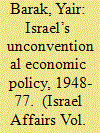

|
|
|
|
|
| Summary/Abstract |
Since its establishment in 1948, Israel’s economic policy has been original and unique, since it was loath to accept imported foreign economic ideas, and at times even explicitly rejected them. When such ideas were partly accepted, they were adjusted to local circumstances – economic, social or political – as understood by the political leadership. This unconventional economic policy was successful – not only by conventional economic standards but also when considering the massive socioeconomic challenges confronted by Israel during its first thirty years of statehood.
|
|
|
|
|
|
|
|
|
|
|
|
|
|
|
|
| 7 |
ID:
185269


|
|
|
| 8 |
ID:
185264
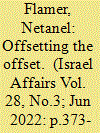

|
|
|
|
|
| Summary/Abstract |
As the inherently weaker party in an asymmetric conflict with a state, most non-state actors tend to revert to an offsetting strategy to neutralise the adversary’s advantages and exploit its vulnerabilities. To counter this strategy stronger parties might adopt a strategy defined in the article as an ‘Offsetting the Offset Strategy’ (OTOS). By exploring Israel’s OTOS vis-à-vis Hamas during the May 2021 Gaza war, this article illustrates and analyses the nature and characteristics of this strategy. It shows that while OTOS has some significant advantages, it also entails several drawbacks that policymakers must take into account.
|
|
|
|
|
|
|
|
|
|
|
|
|
|
|
|
| 9 |
ID:
185262
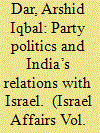

|
|
|
|
|
| Summary/Abstract |
Indian–Israeli relations have been experiencing a ‘historic moment’ since the advent of BJP as a dominant political party in India. Owing to its open embrace of Israel, the Modi-led BJP has become the most pro-Israel government in Indian history. However, contrary to the common attribution of this momentous shift to the ‘Modi factor’, New Delhi’s relations with Israel have been shaped – and continue to be determined – by the ideologies and party positions of the country’s two largest political parties – BJP and Congress.
|
|
|
|
|
|
|
|
|
|
|
|
|
|
|
|
| 10 |
ID:
185270


|
|
|
|
|
| Summary/Abstract |
This article seeks to further understanding of the primary role of trust repair after the Israeli banks crisis of 1983. Israel provides dramatic example of a country that experienced a severe banking crisis. Through the lens of qualitative historical analysis, the article analyses trust transgression of the Israeli banks crisis, as well as trust repair strategies. The analysis reveals a severe trust crisis in the banking sector characterised by integrity violations and deceptions. Lessons from the analysis are valuable to understand the importance of timely, transparent, and consistent intervention after a crisis.
|
|
|
|
|
|
|
|
|
|
|
|
|
|
|
|
|
|
|
|
|